by Matt Giovanniello | April 26, 2021
This time last year, we wrote about how our patented web app provides individualized therapy tools for patients suffering from stroke, dementia, and TBI. Among the litany of unthinkable consequences arising from a worldwide pandemic, one “silver lining” did develop — our expansion to education, with a new focus on special needs students with autism, Down syndrome, and related intellectual disabilities. We’re inspired by this truly special population and thrilled to share updates about FrenalyticsEDU, our branded version of Frenalytics specifically for K-12 special needs programs. Our updates below, where applicable, will reference FrenalyticsEDU when specifically about our work in the special needs sector.
First, the highlights:
- ? At the end of Q1, we have nearly 100 registered end-users (patients & students) and over 30 caregivers (family members, clinicians, and teachers)!
- ? Students love Frenalytics — they’ve completed over 700 Learning Sessions!
- ???? Teachers & schools love Frenalytics too — we’re in over a half-dozen special ed classrooms from kindergarten all the way through high school.
- ? We’re raising money — we were among 50 companies (from over 700 applicants) selected for the Mercury Raise W21 program, and we hope to have some exciting news to share in next quarter’s Progress Report. Stay tuned!
Session Dashboard v3
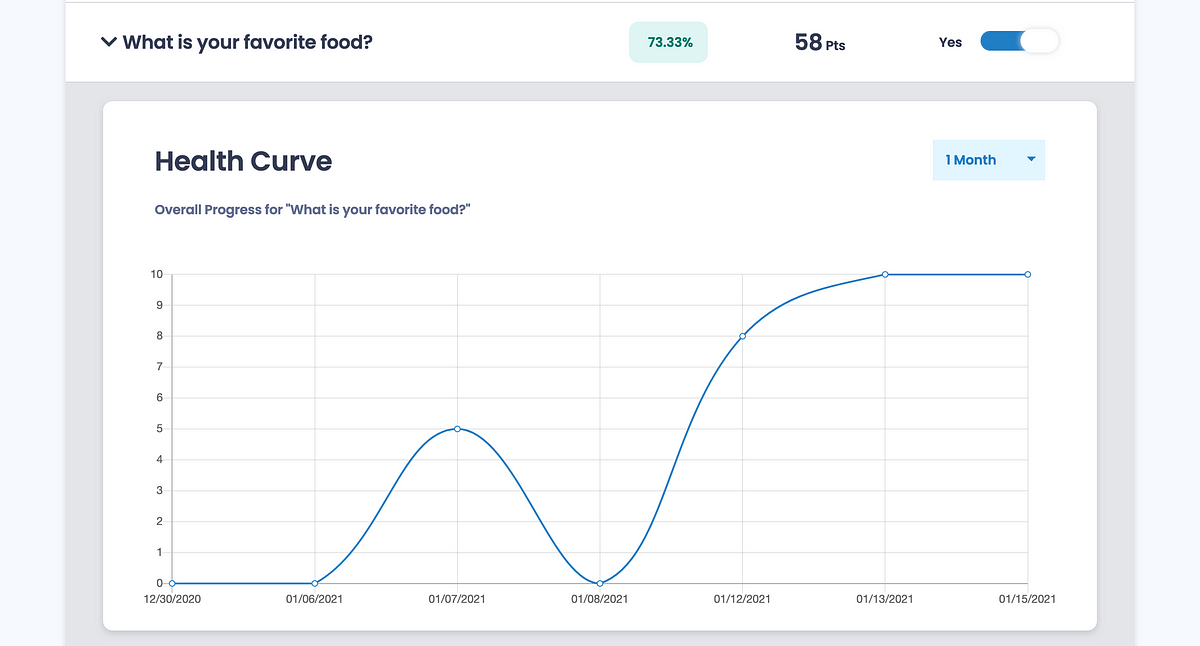
In our 2020 Q3 + Q4 Progress Report, we shared exciting advancements to our Session Dashboard: an interactive Health Curve for overall progress, as well as per-section statistics with a matching Health Curve to visualize improvement.
In Q1, we released our Health Curve for per-question statistics. This allows caregivers to review performance at the most granular level to see how well patients and students are doing on individual questions within each of our sections. Not only is this immensely helpful for clinicians to pinpoint areas of growth and places for improvement, but it also allows teachers to reference concrete data when when updating their IEPs — a powerful way to help educators set tangible goals and increase student engagement.
? Coming soon in v4: Export Session Dashboard data for even greater analysis and data-rich IEPs!
Improved Learning Session Feedback
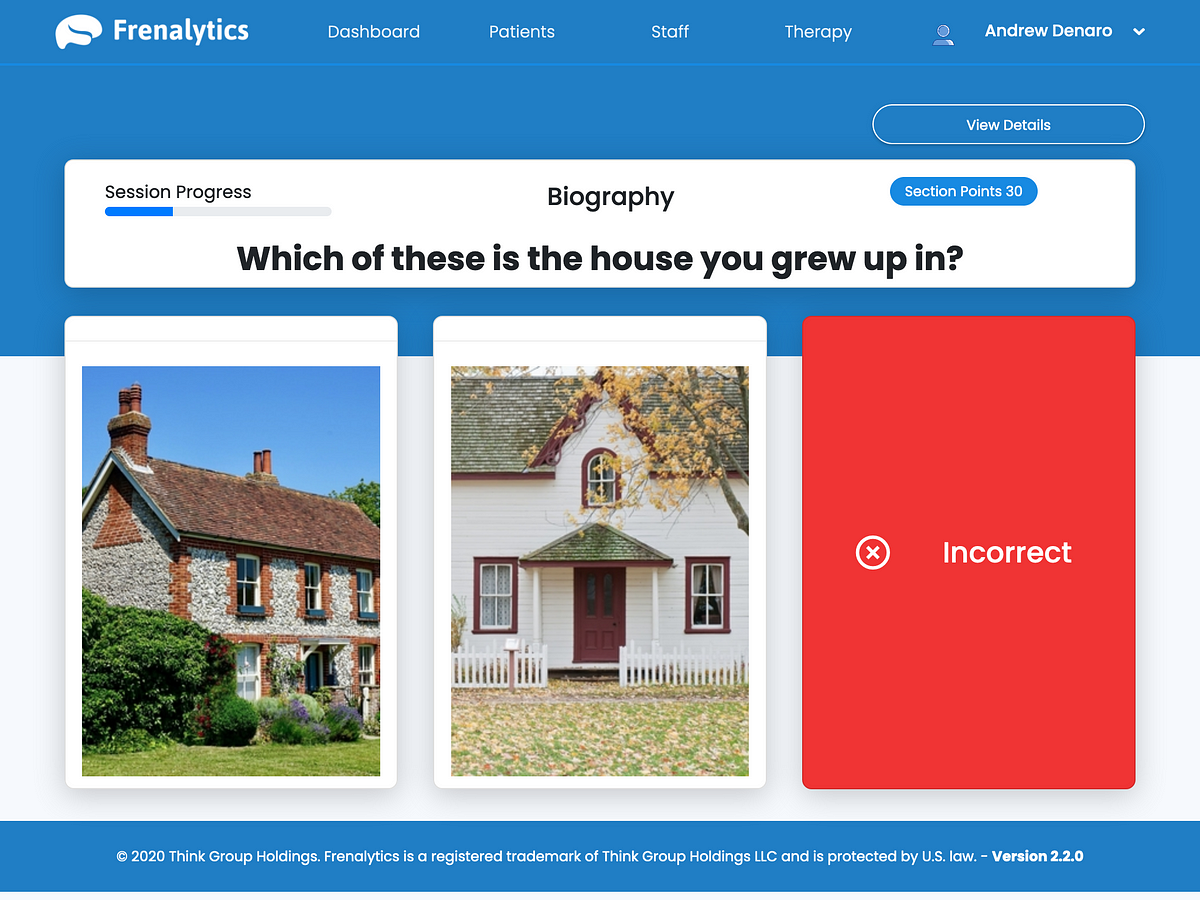
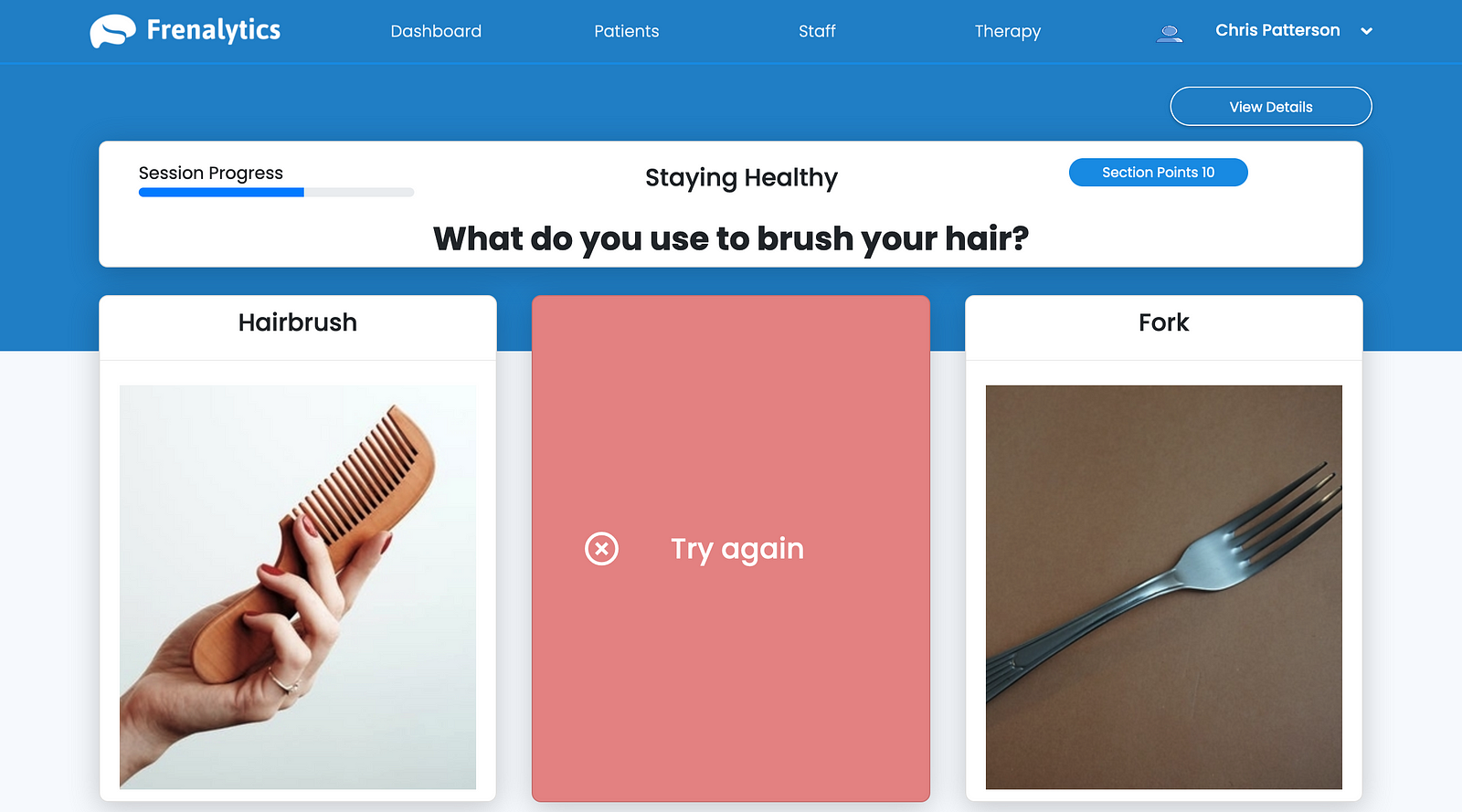
In response to feedback from Alison Bonds Shapiro, a passionate advocate for stroke survivors who suffered from several near-fatal strokes herself, we ditched the rather harsh “Incorrect” feedback message for a more encouraging “Try again”. And, thanks to feedback from current users, we also softened the background color to a more subtle red, while keeping an overall red tone that’s recognizable by patients and students as something “needing fixing” or “not correct”.
? Coming soon: Ability to customize the background color for correct and incorrect answers, as well as other preferences, through a Settings module!
Suggested Answers in Questionnaire
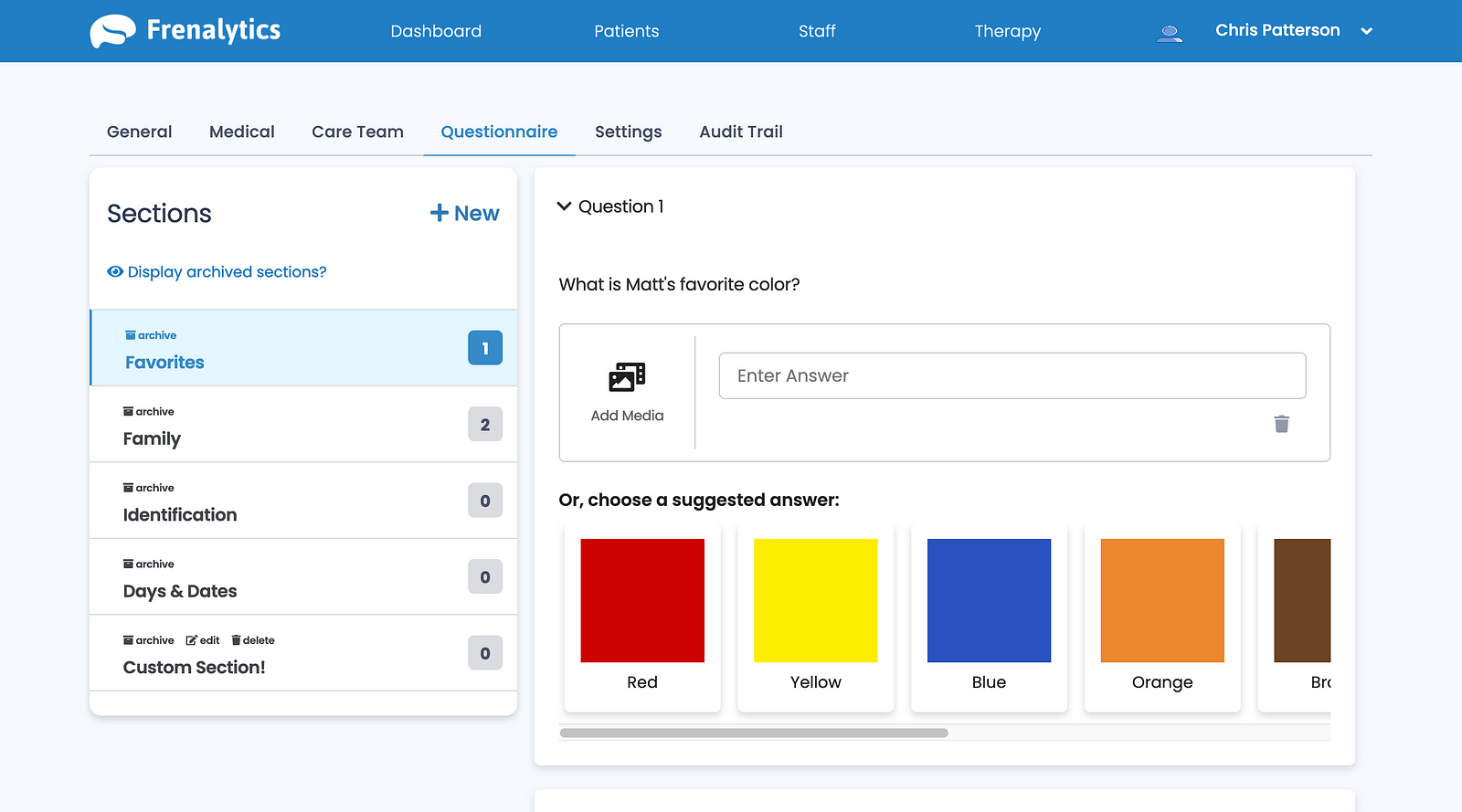
In the second half of 2020, we revamped the Questionnaire experience completely to make it easier and more intuitive to input information about a patient or student for our personalized Learning Sessions.
In Q1, we took this a step further with suggested answers — a one-click option to answer questions like, “What is Matt’s favorite color?” and “What is your favorite food?” Gone are the days of searching for blue boxes and stock images of pasta on Google Images!
? Coming soon in v3: Pull in media from Facebook, Instagram, YouTube and more with new integrations! (originally shared in our 2020 Q3 + Q4 Progress Report as a goal for this year — it’s in the works ?)
End-of-Session Summary
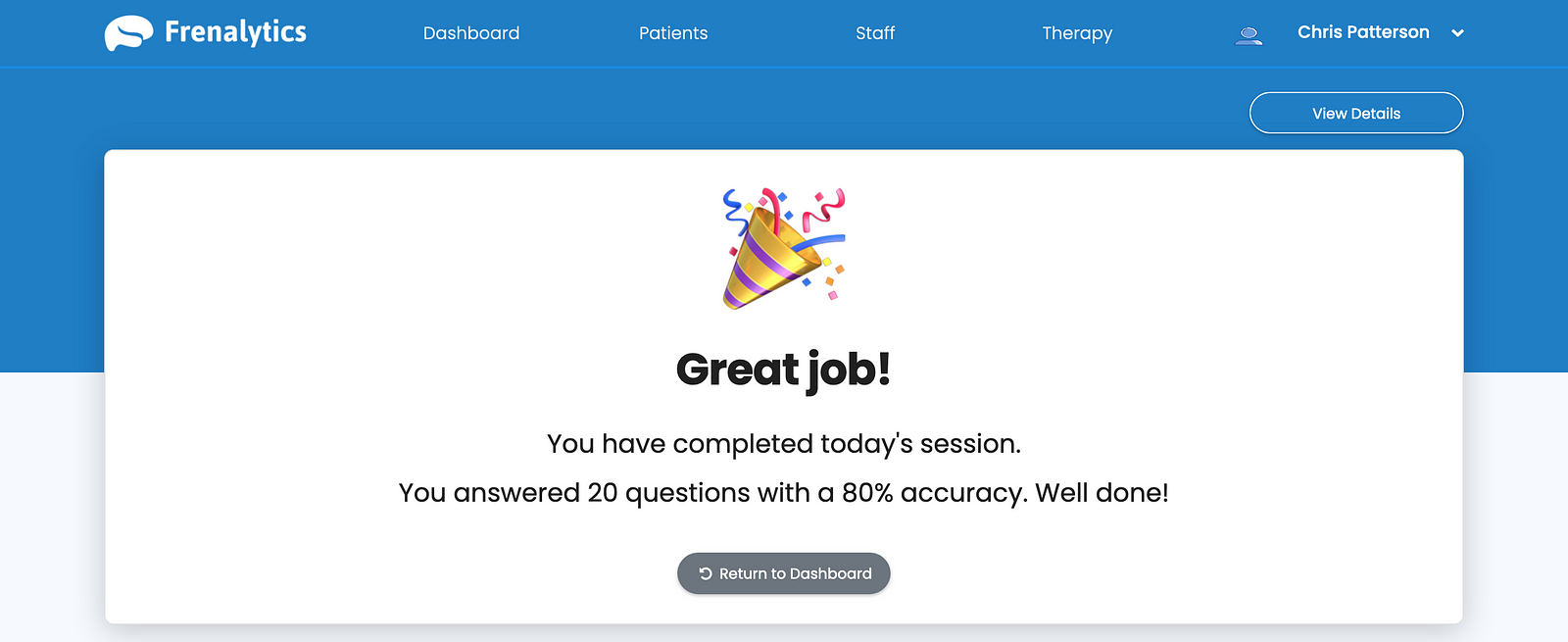
Every victory is worth celebrating — that’s why we created the End-of-Session Summary that displays after a patient or student answers their last question in a Learning Session. It’s a great way to signify the end of a productive session and quickly see what they accomplished!
? Coming soon in v2: Patients and students can optionally indicate how they feel (great, alright, not so good) at the beginning and end of each session to see how mood affects performance.
Spring Intern Program





In our 2020 Q1 + Q2 Progress Report I wrote about the start of our Intern Program with a summer cohort, and our 2020 Q3 + Q4 Progress Report covered our Fall Intern Program with some new (and familiar!) faces.
In Q1, we kicked off an exciting Spring Intern Program with three new members and two interns continuing the spring semester:
- Will: Joining us as a Computer Engineering intern at Villanova University in late December, Will has been hard at work building a new Progress Report module that makes sharing notes with other caregivers a seamless task.
- Caroline: Also joining us from Villanova University as a Computer Engineering student and also working alongside Will on the new Progress Report module, Caroline (and the whole team!) is excited to release her work to our users towards the end of Q2.
- Charlotte: A senior at Boston College focusing on content marketing, Charlotte has written a handful of deeply insightful blog posts on school reopening plans in the wake of COVID-19, helping students with autism transition back to the classroom, unexpected positives for special education from the pandemic, and more!
- Kelley: A marketing intern with us since the summer, Kelley shifted focus to growth strategies and content marketing — including a deep-dive into the world of IEPs and how teachers can use FrenalyticsEDU to effectively teach life skills remotely.
- John: A Computer Science intern also with us since the summer, John continues to develop a Frenalytics Mobile app written entirely in Flutter. This cross-platform mobile app, slated for release in late Q2, includes native Questionnaire, Session Dashboard, and Learning Session functionality in a mobile-friendly and accessible format.
2021 Goals Check
In our 2020 Q3 + Q4 Progress Report, we shared some of our 2021 goals with you. Here’s where we are so far:
- Funding Opportunities: We’re actively raising our first round and are keeping our lips sealed until Q2’s Progress Report. Reach out if you’re interested in joining our round or know someone who may want to! ?
- New Features: We shipped out our Learning Session Dashboard v3, feature updates to the Questionnaire module, an End-of-Session Survey, and more. We’re not there with integrations just yet, but we’re on track to introduce third-party media integrations and integrations with IoT devices later this year. Plus, our cross-platform mobile app will be ready this summer! ?
- User Engagement and Feedback: We’ve onboarded over 40 students at Escondido High School with very positive feedback from both teachers and students; rolled FrenalyticsEDU to additional K-12 classrooms in the U.S.; and are excited to celebrate 1,000 completed Learning Sessions in the next few weeks. Much more to come! ?
Thank you for reading! Cheers to a safe and prosperous summer — see you back here in a few months! ☀️
Questions? Comments? Just want to chat? ? matt@frenalytics.com
![]()
FrenalyticsEDU is a patented, cloud-based interactive platform designed to personalize the learning process for students with autism, Down syndrome, and related intellectual disabilities. The first version of Frenalytics was created by CEO Matt after his grandmother suffered a massive stroke during open-heart surgery. With Frenalytics, teachers and parents are directly involved in their student’s care to make learning fun and engaging, no matter where they may be learning this year.
Want to see how Frenalytics helps special needs students live more independent lives?
Click here to learn more, or give us a call at (516) 399-7170.
Try FrenalyticsEDU for free!
Matt Giovanniello is the CEO and co-founder of Frenalytics. When Matt was 12 years old, his grandmother suffered a devastating stroke during open-heart surgery and didn’t respond to traditional cognitive therapy. His initial version of Frenalytics, a PowerPoint presentation, flipped cognitive therapy on its head by leveraging caregivers – clinicians, family members, and teachers – to create highly personalized multiple-choice games and deliver first-of-its-kind performance analytics. Today, Frenalytics helps patients and students nationwide learn fundamental concepts in a fun and engaging way to help them lead more independent lives. When Matt isn’t working on Frenalytics, he’s likely watching The Office, making quesadillas, or taking a nap.
Contact Matt: matt@frenalytics.com

